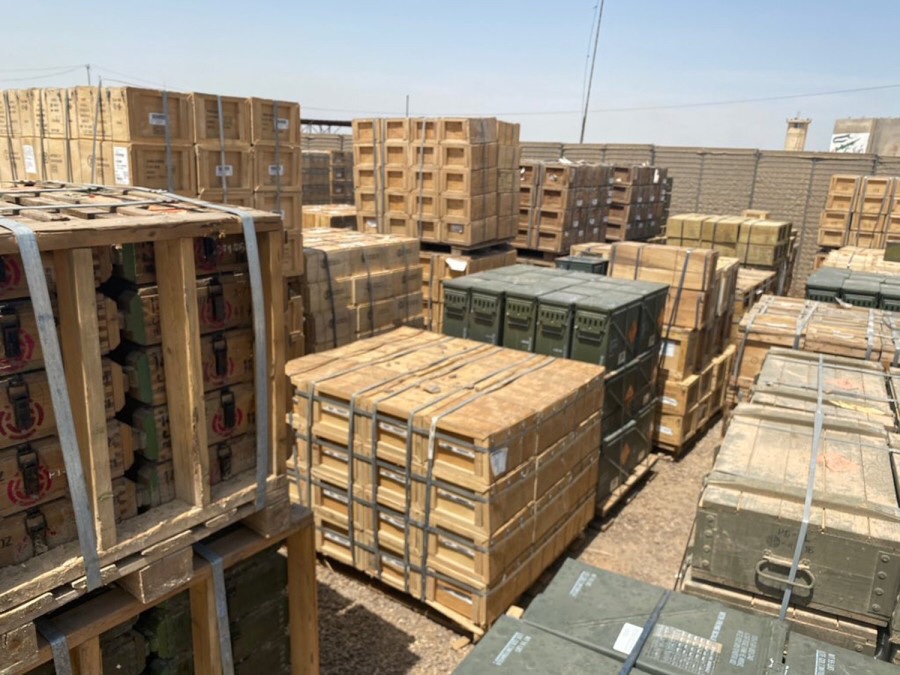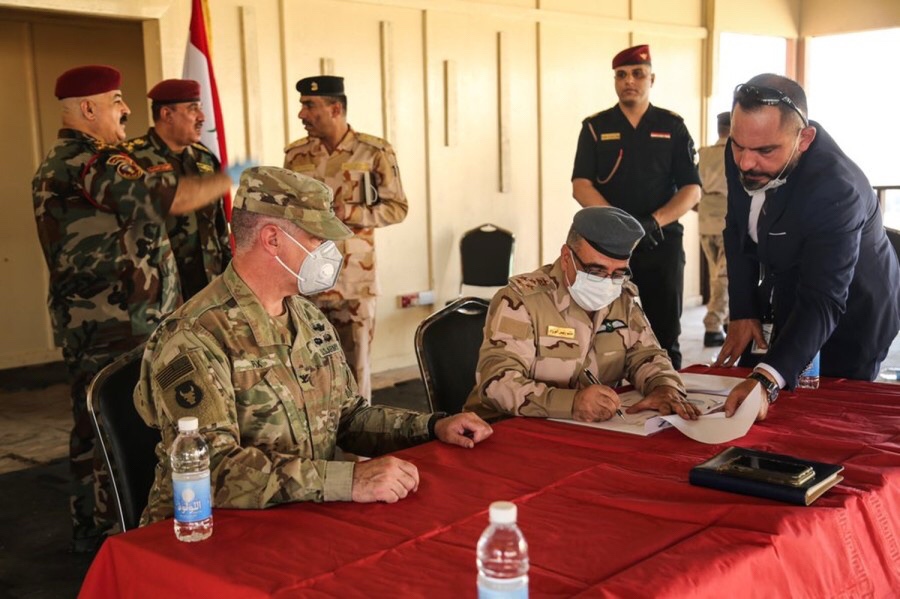The U.S.-backed anti-Islamic State coalition handed over an ammunition storage site at Camp Taji to the Iraqi security forces, Aug. 16, 2020. The coalition has delivered $11 million worth of ammunition to the Iraqis this year, they said in a statement.
TWITTER
The U.S.-led coalition in Iraq transferred about 50 ammunition storage bunkers and facilities to Iraqi forces at Camp Taji, part of a continuing force consolidation as the Islamic State fight wanes and conflict with Iran-backed fighters ramps up.
The handover Sunday was long-scheduled, officials said, but it came hours after two small rockets struck near the base on Saturday night, the latest attack targeting bases where coalition forces are housed, which the U.S. has blamed on Iranian proxy groups.
The rocket strike at the base north of Baghdad did not impact near coalition forces, Army Col. Myles B. Caggins III, a spokesman for the coalition, said on Twitter on Saturday.
Also last week, three rockets fell on Balad Air Base, the Iraqi government said Thursday, then on Friday three more fell on Baghdad’s international airport, it said. On Sunday, one landed inside Baghdad’s Green Zone, where diplomatic and military mission headquarters are based. None of the attacks resulted in significant damage, the Iraqi government said on Twitter.
The strikes all came after the U.S. seized more than 1 million barrels of Iranian oil from four tankers bound for Venezuela last week.

The U.S.-backed anti-Islamic State coalition handed over an ammunition storage site at Camp Taji to the Iraqi security forces, Aug. 16, 2020. The coalition has delivered $11 million worth of ammunition to the Iraqis this year, they said in a statement.
TWITTER
They also come ahead of expected U.S.-Iraq talks, which Central Command boss Gen. Frank McKenzie said would likely involve the long-term presence of American and allied troops.
“I think that is a grave concern to the Iranians because that works against what they want, which is for Iraq to be pretty directly under their control and for us to be out of the theater,” the Marine general said in an online panel hosted by the U.S. Institute of Peace on Wednesday.
McKenzie acknowledged that the rocket attacks have forced the coalition to pull back from the ISIS fight somewhat and divert resources to self-protection. He also expected Iran to launch a fresh “response” after failing to expel the U.S. from Iraq earlier this year.
“I do not know what the nature of that response will be, but we will certainly be ready for it, should it occur,” he said.
U.S.-Iran tensions have risen steadily over the past two years, as President Donald Trump’s administration has tried to pressure Tehran into renegotiating an Obama-era nuclear treaty that Trump withdrew the U.S. from.
article continues below
Sporadic rocket attacks have become commonplace since last fall, and in January a U.S. drone strike killed a top Iranian general in Baghdad, leading Tehran to respond with a barrage of ballistic missiles that hit U.S.-occupied bases in Iraq and left more than 100 American troops with traumatic brain injuries.
Meanwhile, the coalition has removed forces from smaller Iraqi bases, a long-planned effort which officials have said was sped up by the increased threat from Iran-backed militias.
Two American troops and a British soldier were killed at Taji in March, but many of the coalition troops that were once at the base to train Iraqi forces have since gone elsewhere in Iraq or been sent home. There remains a small presence of troops who coordinate logistics and security operations, the coalition said.
Some 5,200 American troops remain in Iraq, but as the government forces take on more responsibility for fighting ISIS, the number of U.S. and coalition troops is expected to shrink, McKenzie said last week.
“We don’t want to maintain a huge number of soldiers forever in Iraq,” McKenzie said.
garland.chad@stripes.comTwitter: @chadgarland

No comments:
Post a Comment